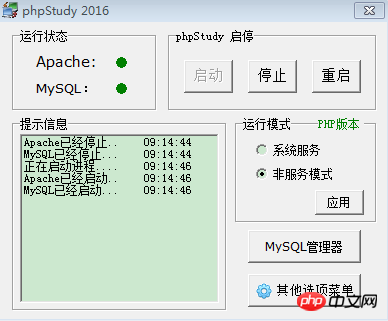
What is phpMyAdmin?
phpMyAdmin is the most widely used among many MySQL graphical management tools. It is a MySQL client software based on B/S mode developed using PHP. This tool is based on Web cross-platform management program and supports Simplified Chinese. Users can download the latest version from the official website.
phpMyAdmin provides web developers with a graphical database operation interface similar to Access and SQL Server. Through this management tool, you can perform various operations on MySQL, how to create databases, data tables and generate MySQL database script files, etc. .
Features
PHP is a server-based scripting language for creating dynamic websites. You can use PHP and HTML to generate the website homepage. When a visitor opens the homepage, the server executes PHP commands and sends the execution results to the visitor's browser. This is similar to ASP and CoildFusion. However, the difference between PHP and them is that PHP is open source and cross-platform. PHP can run on WINDOWSNT and various versions of UNIX. It doesn't require any pre-processing for fast feedback, and it doesn't require mod_perl tweaks to make your server's memory image smaller. PHP consumes fewer resources. When PHP is used as part of the Apache Web server, there is no need to call external binaries to run the code, and the server does not need to bear any additional burden.
In addition to being able to manipulate your pages, PHP can also send HIIP headers. You can set cookies, manage digital signatures and redirect users, and it provides excellent connectivity to other databases (also ODBC), integrating various external libraries to do anything from parsing XML with PDF documents.
phpMyAdmin is a software tool written in PHP that can control and operate the MySQL database through the web. Through phpMyAdmin, you can completely operate the database, such as creating, copying and deleting data, etc. Managing MySQL databases becomes quite simple if you use the right tools. Using the MySQL command line method requires very familiarity with MySQL knowledge, and the same is true for the SQL language. Not only that, if the database is heavily accessed, it will be quite difficult to read the data in the list.
There are currently many GUI MySQL client programs, the most outstanding of which is the Web-based phpMyAdmin tool. This is a PHP-based tool for the MySQL database frontend.
The disadvantage of PhpMyAdmin is that it must be installed on the web server, so without appropriate access rights, other users may damage the SQL data.
Installation process
#If you use the integrated installation package to configure the PHP development environment, there is no need to download phpMyAdmin graphical management separately. Tools, because the integrated installation package basically contains graphical management tools. We use the integrated installation package phpStudy here,

If you are not using the integrated installation package, you need to install the phpMyAdmin graphical management tool yourself. You can go to the official website to download the latest version. We will not introduce the specific installation process in detail here. You can read the article "phpMyAdmin Program Installation Explanation", which introduces the phpMyAdmin installation process in detail!
Use
phpMyAdmin is a MySQL database based on PHP and structured in Web-Base mode on the website host. Library management tools.
Can manage the entire MySQL server (requires super user) or a single database. In order to achieve the latter, you will need to set up the MySQL user appropriately so that he can only read/write to allowed databases. That's until you read the relevant section in the MySQL manual. The next article mainly explains the use of phpMyAdmin. For details, please read " Detailed graphic explanation of database addition, deletion and modification operations (phpMyAdmin usage tutorial)"!
【Related recommendations】
1. Relevant topic recommendations: "phpMyAdmin usage tutorial"
2. Related video courses Recommended: "MySQL Free Online Tutorial"
3. Online download of related tools: "phpMyAdmin Tool Download"
The above is the detailed content of Introduction to phpMyAdmin. For more information, please follow other related articles on the PHP Chinese website!
 Commonly used mysql management tools
Commonly used mysql management tools
 What to do if phpmyadmin fails to import sql file
What to do if phpmyadmin fails to import sql file
 How to change phpmyadmin to Chinese
How to change phpmyadmin to Chinese
 What's going on when phpmyadmin can't access it?
What's going on when phpmyadmin can't access it?
 Is it necessary to upgrade windows 11?
Is it necessary to upgrade windows 11?
 PathFileExists usage
PathFileExists usage
 How to buy Ripple in China
How to buy Ripple in China
 Introduction to the main work content of front-end engineers
Introduction to the main work content of front-end engineers




